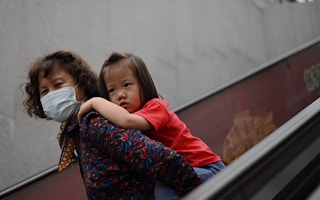A former victim of the ruling Chinese Communist Party (CCP)’s draconian “one-child” curbs has hit out at the government over a 180-degree policy shift that now seeks to encourage Chinese citizens to have up to three children per married couple.
Ling Baozhen, whose family was targeted by officials in his home province of Jiangsu, said his parents were issued with punitive fines under the one-child policy for an “excess birth” outside of allowed quotas.
“Family planning policies are a violation of basic human rights, as well as a gross violation of human dignity,” Ling told RFA on Tuesday. “My parents went into hiding in Tibet to give birth to me, and they were fined 30,000 yuan and somebody took away all of our household belongings.”
“Now we are seeing the negative consequences of those policies, with an ageing society and a population imbalance, with not enough working-age people,” Ling said.
Later, Ling’s sister was forced into a late-term abortion by family planning officials, he said.
“They forcibly aborted my sister’s seven-month-old fetus … Family planning policies are a crime against humanity,” Ling said.
Ling said he also fears that the new, three-child policy could lead to further injustice.
“
For wealthy families, there is no problem in having three children, or even more, but it’s very hard for people on the bottom rung of the social ladder to even buy a place to live, and to marry.
Ling Baozhen, Jiangsu province
“Whether or not to have a child should be left to families to decide, with no forcible intervention [from government],” he said.
State media articles on social media platforms attracted huge numbers of comments after they were posted, with many people questioning the government’s right to interfere with their reproductive choices.
“People are seen as resources, or tools,” Sina Weibo account @chndgn commented. “People should first and foremost be seen as adults.”
“What does it mean to be a person? It means to have free will,” the user wrote. “People shouldn’t live their lives for their country, nor should every aspect of their lives be planned.”
Former policy scrapped
The ruling Chinese Communist Party (CCP) on Monday unveiled new plans to boost flagging birth rates and reverse population ageing, raising the official limit on the number of children per couple from two to three.
The move came five years after the CCP scrapped a historic policy limiting most couples to just one child, which gave rise to decades of human rights abuses, including forced late-term abortions and sterilizations, as well as widespread monitoring of women’s fertility by officials.
Among the support measures planned by the government include improvements to prenatal and postnatal care, a universal childcare service, and reduced education costs for families.
China’s fertility rate stood at around 1.3 children per woman in 2020, compared with the 2.1 children per woman needed for the population to replace itself.
A retired demographics scholar who gave only a surname Yan said the three-child policy is unlikely to help much, however.
“Nobody can afford to give birth to children, or to raise them,” Yan told RFA. “There is already too much pressure on working-age adults, between the ages of 18 and 55, and the pressures are even worse on those in their twenties and thirties.”
“There will need to be a sea change in the way society operates if they want to make it affordable for those people to have and raise kids,” he said.
He said older generations would have raised their children in different circumstances, often with three generations living under the same roof.
“The old way of doing it was that the parents would go out to work, and the grandparents would look after the kids,” he said. “This was a more reasonable approach.”
“We don’t really have three-generation living any more.”
This story was published with permission from Radio Free Asia.










